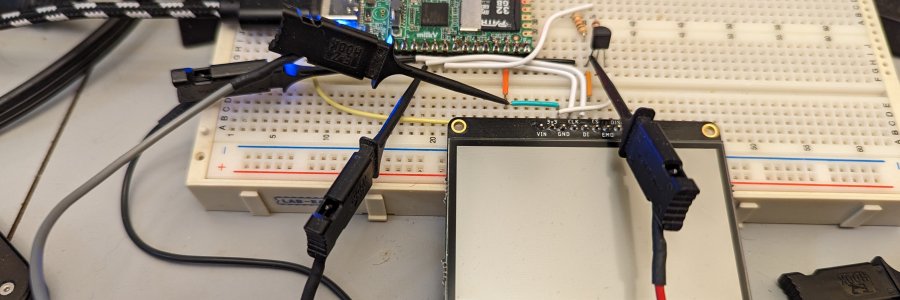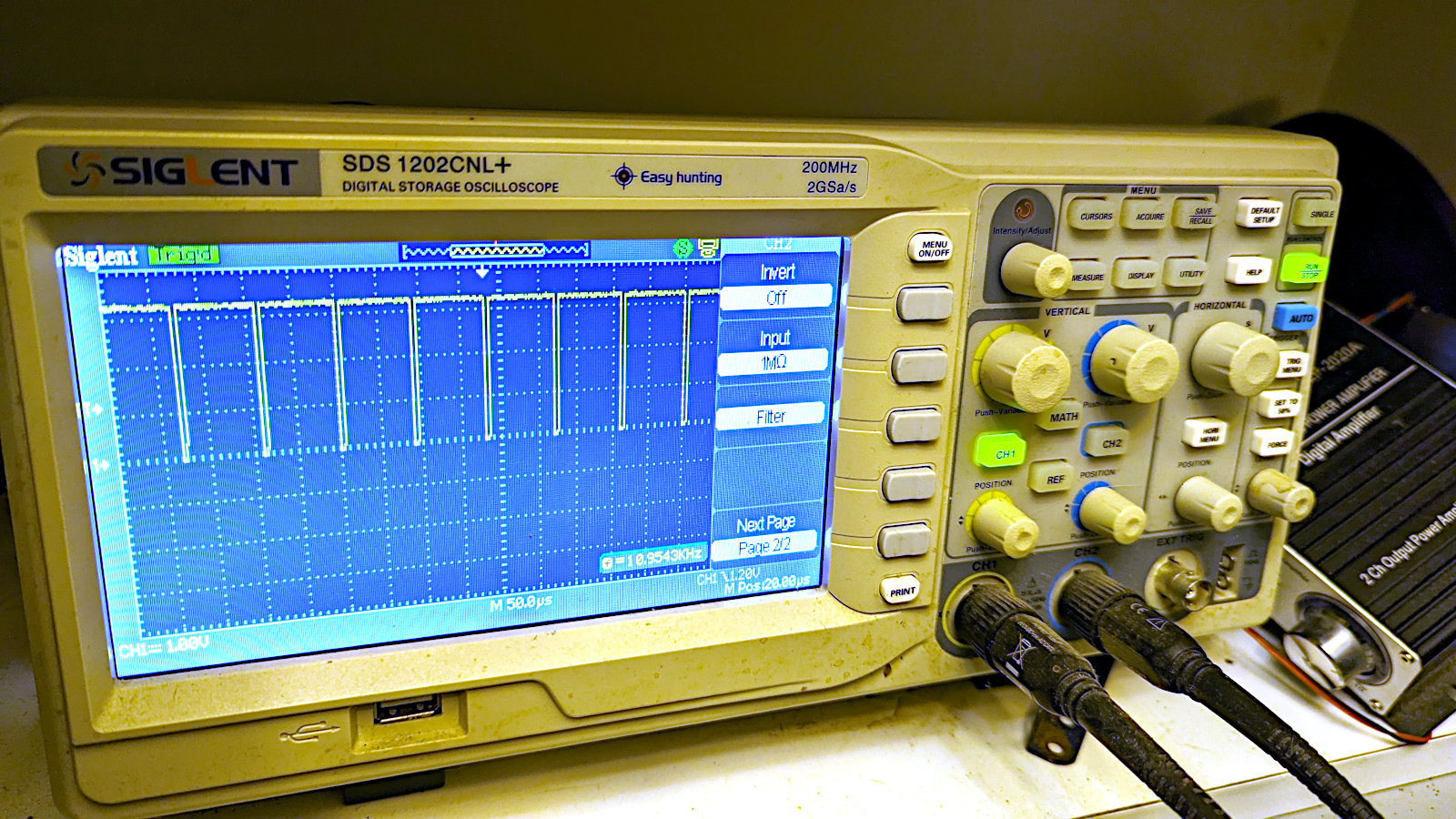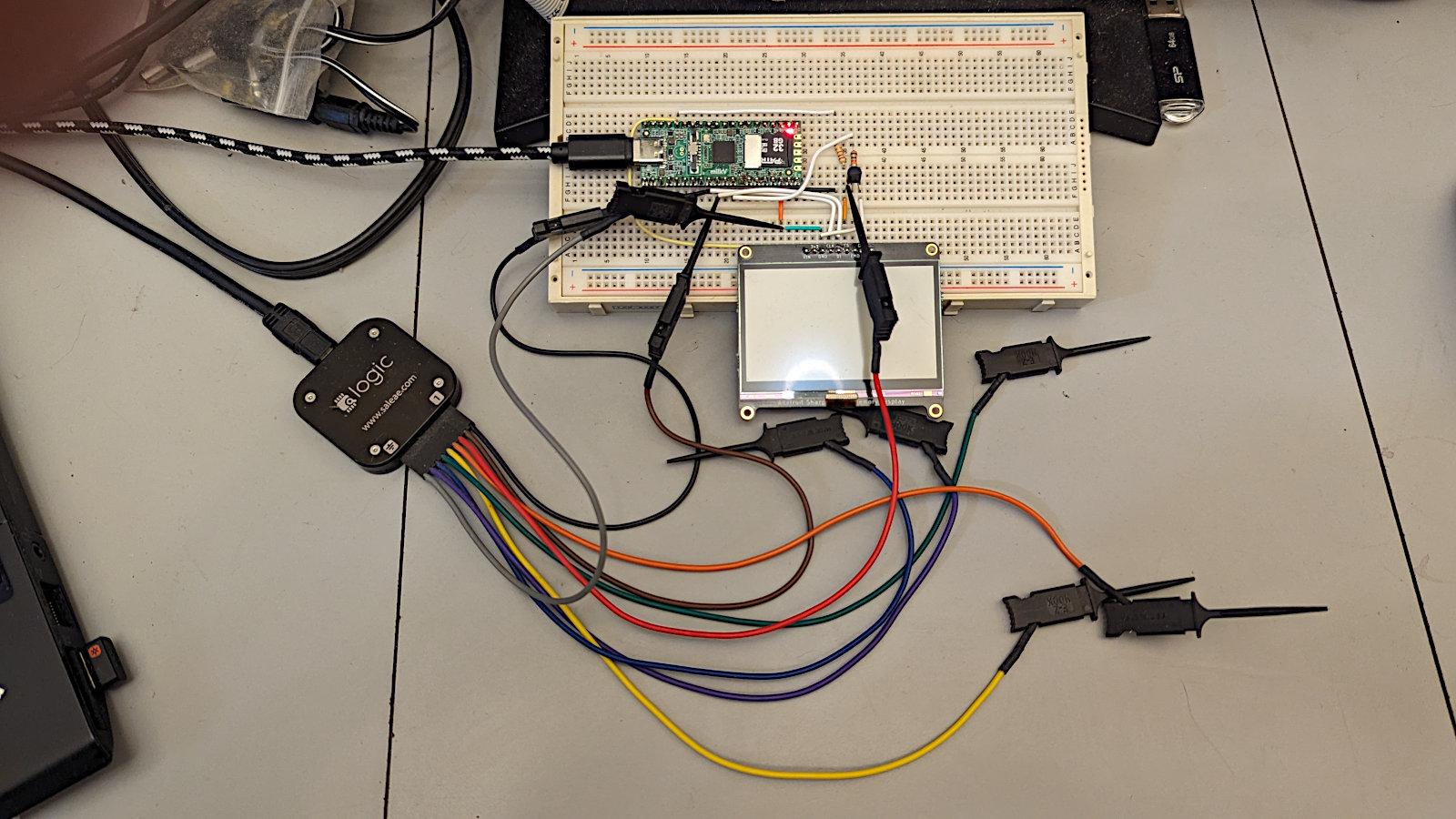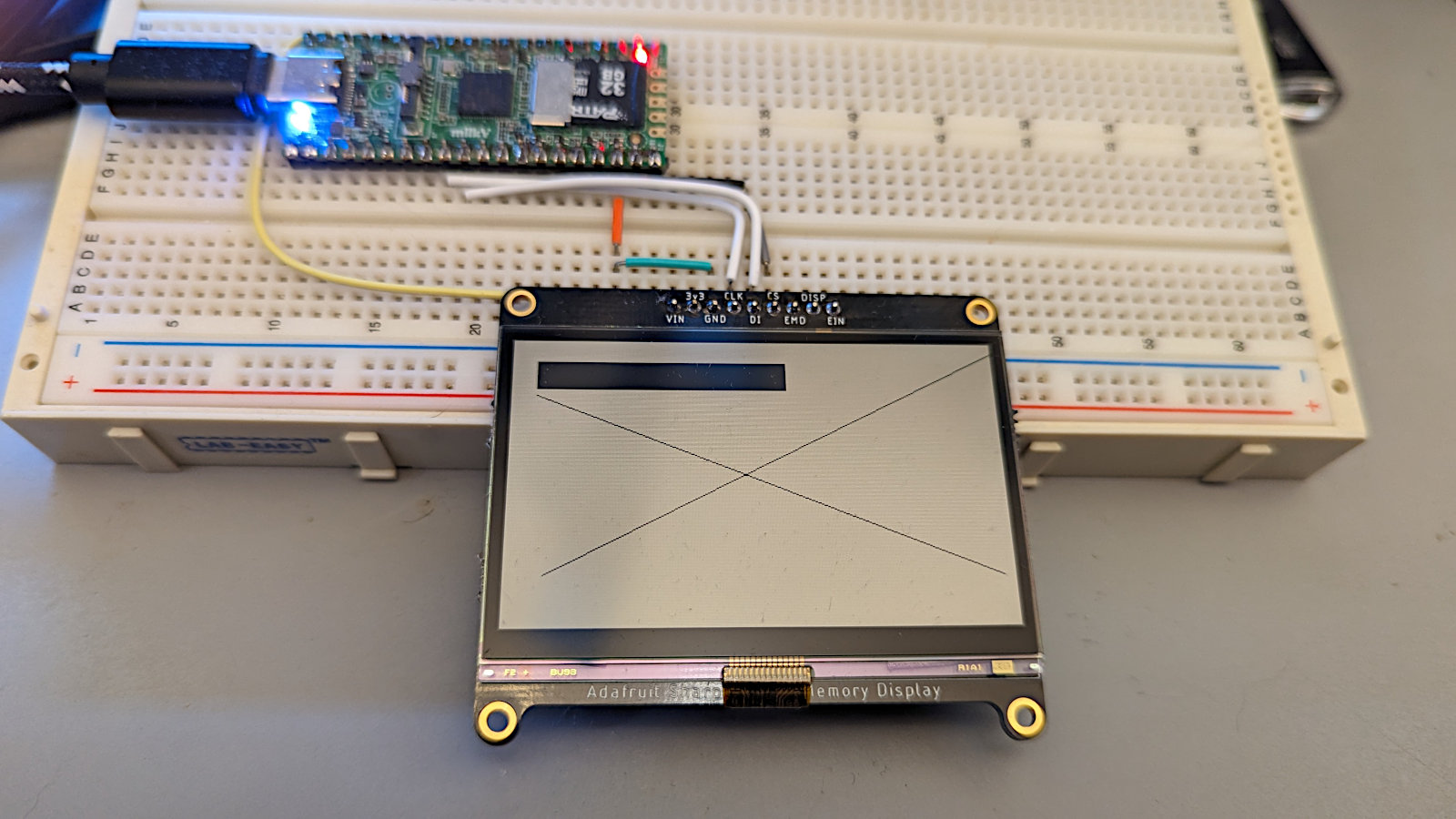I bought an Adafruit Sharp Memory Display breakout. It's a 400x240 monochrome display driven by SPI. It can run on either 3.3V or 5V. The memory mapping is simple - just sequential bytes with one bit per pixel - 50 bytes per line. The SPI is LSB-first with active-high CS.
I know that in my previous post I said, "... WiringX just doesn't work. It needs a lot of work. The way it is now is useless." I was at least partly wrong.
I wrote bitbang code to drive the Sharp display. It worked fine, but was WAY too slow. WiringX's digitalWrite() command is very slow. I had to get the hardware SPI working. So I wrote code to use WiringX SPI.
It "worked", as in it was sending data, and I could watch it with the logic analyzer and oscilloscope, but the display wasn't doing anything. I then realized that WiringX's SPI only does MSB-first and its CS line is active-low only. No good.
I fixed the CS line by adding a 2N2222 transistor and a couple resistors to invert its output.
Still no display because of the MSB-first thing. I decided on just reversing every byte the program was sending before sending it. To keep it fast I used a lookup table. Still no display.
So I removed the CS inverter circuit and CS wire and controlled CS myself from a GPIO pin. No problem. This is definitely not the first time I've controlled my own CS for SPI.
That fixed it! The display was now working, only VERY slowly. So I cranked the SPI speed from something like 10,000 up to 500,000. Better. Pushed it step by step to 6,000,000 - even better. In the end I was able to go as high as 8,000,000. At that speed it was sending with 125 nS clock cycles, and the display was very quick. I tried 9,000,000, but the SPI clock got unstable, so back to 8,000,000.
Some simple demo code.
sharp_mem.c
#include <stdio.h>
#include <string.h>
#include <stdlib.h>
#include <math.h>
#include <unistd.h>
#include <wiringx.h>
#include "sharp_mem.h"
int CS = 14; //CS - physical pin 19
unsigned char framebuff[0x2ee0];
int fd_spi;
int main(void){
int x1,y1,x2,y2,x3,y3,x4,y4;
int dx1,dy1,dx2,dy2,dx3,dy3,dx4,dy4;
init();
cls();
x1 = 20;
y1 = 5;
x2 = 100;
y2 = 10;
x3 = 300;
y3 = 115;
x4 = 74;
y4 = 12;
dx1 = -3;
dy1 = 2;
dx2 = 3;
dy2 = -3;
dx3 = -3;
dy3 = 4;
dx4 = -3;
dy4 = -4;
while(1){
clearbuff();
line(x1,y1,x2,y2,1);
line(x2,y2,x3,y3,1);
line(x3,y3,x4,y4,1);
line(x4,y4,x1,y1,1);
x1 += dx1;
y1 += dy1;
x2 += dx2;
y2 += dy2;
x3 += dx3;
y3 += dy3;
x4 += dx4;
y4 += dy4;
if((x1 >= 399 - dx1) || (x1 <= 0 - dx1)){
dx1 = -dx1;
x1 += dx1;
}
if((y1 >= 239 - dy1) || (y1 <= 0 - dy1)){
dy1 = -dy1;
y1 += dy1;
}
if((x2 >= 399 - dx2) || (x2 <= 0 - dx2)){
dx2 = -dx2;
x2 += dx2;
}
if((y2 >= 239 - dy2) || (y2 <= 0 - dy2)){
dy2 = -dy2;
y2 += dy2;
}
if((x3 >= 399 - dx3) || (x3 <= 0 - dx3)){
dx3 = -dx3;
x3 += dx3;
}
if((y3 >= 239 - dy3) || (y3 <= 0 - dy3)){
dy3 = -dy3;
y3 += dy3;
}
if((x4 >= 399 - dx4) || (x4 <= 0 - dx4)){
dx4 = -dx4;
x4 += dx4;
}
if((y4 >= 239 - dy4) || (y4 <= 0 - dy4)){
dy4 = -dy4;
y4 += dy4;
}
transbuff();
}
}
//set or clear a pixel in framebuff[]
//color 0 clear pixel - 1 set pixel
void setpix(int x,int y,unsigned char color){
int byte;
unsigned char bit, mask = 1;
byte = (x / 8) + (y * 0x32);
bit = x - ((x / 8) * 8);
mask <<= bit;
if(color==0)
framebuff[byte] |= mask;
else
framebuff[byte] ^= mask;
}
void cls(void){
unsigned char byte[2] = {0x60,0x00}; //clear screen - VCOM bit set - CLEAR bit set
digitalWrite(CS,HIGH);
wiringXSPIDataRW(2,byte,2); //dummy EOL byte - this does not clear the framebuffer
digitalWrite(CS,LOW);
}
//DDA Line Algorithm - from geeksforgeeks.org
void line(int x1,int y1,int x2,int y2,unsigned char color){
int dx = x2 - x1; //#2
int dy = y2 - y1;
int steps = abs(dx) > abs(dy) ? abs(dx) : abs(dy);
float xinc = dx / (float)steps;
float yinc = dy / (float)steps;
float x = x1;
float y = y1;
for(int i = 0;i <= steps;i++){ //#5
setpix(round(x),round(y),color); //#6
x += xinc;
y += yinc;
}
}
//write framebuff to display RAM
void transbuff(){
unsigned char line[52];
unsigned char byte[1] = {0x80};
for(int x=0;x<0x2ee0;x++) //reverse framebuff bytes for MSB-first send
framebuff[x] = BitReverseTable256[framebuff[x]];
digitalWrite(CS,HIGH); //start send
wiringXSPIDataRW(2,byte,1); //send write command
for(int row=0;row<0xf0;row++){ //send framebuff
line[0] = BitReverseTable256[row];
memcpy(line + 1, framebuff + (row * 50), 50);
line[51] = 0x00; //send dummy EOL byte
wiringXSPIDataRW(2,line,52);
}
digitalWrite(CS,LOW); //end transmission
}
void clearbuff(void){ //clear framebuff to 0xff (white)
for(int x=0;x<0x2ee0;x++)
framebuff[x] = 0xff;
}
void init(){
//wiringx init
if(wiringXSetup("duo", NULL) == -1){
wiringXGC();
}
//set up GPIO pin for CS
pinMode(CS,PINMODE_OUTPUT);
digitalWrite(CS,LOW);
//spi init
if((fd_spi = wiringXSPISetup(2,8000000)) < 0){
printf("SPI Setup failed: %d\n", fd_spi);
wiringXGC();
}
//clear buffer to $ff
for(int x=0;x<0x2ee0;x++)
framebuff[x] = 0xff;
}sharp_mem.h
// Reverse table is used because we don't know how to change bit-order on SPI settings
unsigned char BitReverseTable256[] =
{0x00, 0x80, 0x40, 0xC0, 0x20, 0xA0, 0x60, 0xE0, 0x10, 0x90, 0x50, 0xD0, 0x30, 0xB0, 0x70, 0xF0,
0x08, 0x88, 0x48, 0xC8, 0x28, 0xA8, 0x68, 0xE8, 0x18, 0x98, 0x58, 0xD8, 0x38, 0xB8, 0x78, 0xF8,
0x04, 0x84, 0x44, 0xC4, 0x24, 0xA4, 0x64, 0xE4, 0x14, 0x94, 0x54, 0xD4, 0x34, 0xB4, 0x74, 0xF4,
0x0C, 0x8C, 0x4C, 0xCC, 0x2C, 0xAC, 0x6C, 0xEC, 0x1C, 0x9C, 0x5C, 0xDC, 0x3C, 0xBC, 0x7C, 0xFC,
0x02, 0x82, 0x42, 0xC2, 0x22, 0xA2, 0x62, 0xE2, 0x12, 0x92, 0x52, 0xD2, 0x32, 0xB2, 0x72, 0xF2,
0x0A, 0x8A, 0x4A, 0xCA, 0x2A, 0xAA, 0x6A, 0xEA, 0x1A, 0x9A, 0x5A, 0xDA, 0x3A, 0xBA, 0x7A, 0xFA,
0x06, 0x86, 0x46, 0xC6, 0x26, 0xA6, 0x66, 0xE6, 0x16, 0x96, 0x56, 0xD6, 0x36, 0xB6, 0x76, 0xF6,
0x0E, 0x8E, 0x4E, 0xCE, 0x2E, 0xAE, 0x6E, 0xEE, 0x1E, 0x9E, 0x5E, 0xDE, 0x3E, 0xBE, 0x7E, 0xFE,
0x01, 0x81, 0x41, 0xC1, 0x21, 0xA1, 0x61, 0xE1, 0x11, 0x91, 0x51, 0xD1, 0x31, 0xB1, 0x71, 0xF1,
0x09, 0x89, 0x49, 0xC9, 0x29, 0xA9, 0x69, 0xE9, 0x19, 0x99, 0x59, 0xD9, 0x39, 0xB9, 0x79, 0xF9,
0x05, 0x85, 0x45, 0xC5, 0x25, 0xA5, 0x65, 0xE5, 0x15, 0x95, 0x55, 0xD5, 0x35, 0xB5, 0x75, 0xF5,
0x0D, 0x8D, 0x4D, 0xCD, 0x2D, 0xAD, 0x6D, 0xED, 0x1D, 0x9D, 0x5D, 0xDD, 0x3D, 0xBD, 0x7D, 0xFD,
0x03, 0x83, 0x43, 0xC3, 0x23, 0xA3, 0x63, 0xE3, 0x13, 0x93, 0x53, 0xD3, 0x33, 0xB3, 0x73, 0xF3,
0x0B, 0x8B, 0x4B, 0xCB, 0x2B, 0xAB, 0x6B, 0xEB, 0x1B, 0x9B, 0x5B, 0xDB, 0x3B, 0xBB, 0x7B, 0xFB,
0x07, 0x87, 0x47, 0xC7, 0x27, 0xA7, 0x67, 0xE7, 0x17, 0x97, 0x57, 0xD7, 0x37, 0xB7, 0x77, 0xF7,
0x0F, 0x8F, 0x4F, 0xCF, 0x2F, 0xAF, 0x6F, 0xEF, 0x1F, 0x9F, 0x5F, 0xDF, 0x3F, 0xBF, 0x7F, 0xFF};
void transbuff(void);
void cls(void);
void init(void);
void setpix(int,int,unsigned char);
void line(int,int,int,int,unsigned char);
void clearbuff(void);
unsigned char rbo(unsigned char);


